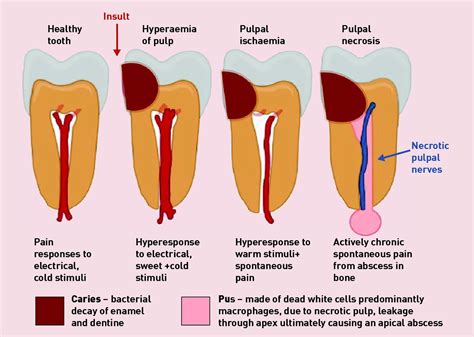Dead Tooth Nerve: Symptoms, Duration, and Treatment
A dead tooth nerve, more accurately described as pulpal necrosis, is a serious dental condition where the tooth's nerve (pulp) dies due to infection, trauma, or decay. This isn't a condition to ignore; it requires prompt professional dental care. Understanding the symptoms and duration of this condition is crucial for timely intervention and preventing further complications.
What are the Symptoms of a Dead Tooth Nerve?
The symptoms of a dead tooth nerve can vary depending on the stage of the infection and the individual's sensitivity. Some people experience minimal discomfort, while others face intense pain. Here are some common signs:
- Severe, throbbing pain: This is often the most prominent symptom, especially in the initial stages. The pain can radiate to other parts of the face, jaw, or even ears.
- Sensitivity to temperature: Extreme hot or cold temperatures can trigger intense pain in a tooth with a dead nerve. This sensitivity may be present even after the initial pain subsides.
- Swelling: Inflammation and swelling of the gums around the affected tooth are possible.
- Discoloration: The tooth may appear darker than its surrounding teeth, often exhibiting a grayish, brownish, or blackish hue. This is because the blood supply to the tooth is compromised.
- Persistent pain: Even without external stimuli, a dull, persistent ache may be present.
- Pus formation: In advanced cases, an abscess may form, characterized by a collection of pus at the root of the tooth. This can lead to significant swelling and facial pain.
- Bad taste or odor: A foul taste or odor in the mouth can be a sign of infection.
It’s crucial to note: Not everyone experiences all these symptoms. Some individuals might have a seemingly asymptomatic dead tooth nerve, discovered only during a routine dental check-up through X-rays. This highlights the importance of regular dental visits.
How Long Does a Dead Tooth Nerve Last?
There's no set duration for a dead tooth nerve. The timeframe depends on several factors, including the underlying cause, the individual's immune response, and the extent of the infection. If left untreated, the infection can persist for weeks, months, or even years, progressively worsening and potentially leading to serious complications.
Untreated pulpal necrosis can lead to:
- Tooth abscess: A localized infection that can spread to the jawbone and surrounding tissues.
- Cellulitis: A severe infection of the facial tissues.
- Osteomyelitis: An infection of the bone.
- Sepsis: A life-threatening condition caused by the body's overwhelming response to an infection.
How is a Dead Tooth Nerve Treated?
Treatment options for a dead tooth nerve depend on the severity of the infection and the overall health of the tooth. Common treatment approaches include:
- Root Canal Therapy: This procedure involves removing the infected pulp, cleaning and shaping the root canals, and filling them with a sealant to prevent reinfection. This is often the preferred treatment to save the natural tooth.
- Extraction: If the tooth is severely damaged or the infection is too advanced, extraction may be necessary. This involves removing the tooth entirely.
- Apicoectomy: In some cases, a surgical procedure called an apicoectomy might be performed. This involves removing the infected tip of the root.
Can a Dead Tooth Nerve Heal on its Own?
No. A dead tooth nerve will not heal on its own. The nerve tissue is dead, and the infection will continue to spread if left untreated. Seeking professional dental care is essential to prevent further complications.
What Causes a Dead Tooth Nerve?
Several factors can contribute to the death of a tooth's nerve:
- Extensive tooth decay: Deep cavities that reach the pulp can lead to infection and nerve death.
- Trauma: A significant injury to the tooth, such as a fracture or severe blow, can damage the nerve.
- Dental procedures: In rare cases, dental procedures like a root canal can inadvertently cause damage to the remaining pulp tissue.
- Gum disease (periodontal disease): Severe gum disease can compromise blood supply to the tooth, potentially leading to nerve death.
When Should I See a Dentist?
If you experience any symptoms suggestive of a dead tooth nerve, such as persistent pain, sensitivity to temperature, swelling, or discoloration, you should seek professional dental care immediately. Early intervention is crucial for preventing more significant complications.
This information is for educational purposes only and should not be considered medical advice. Always consult with a qualified dental professional for diagnosis and treatment of any dental condition.

